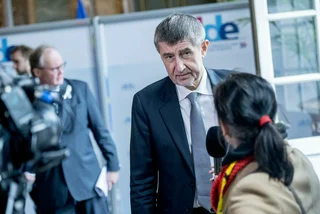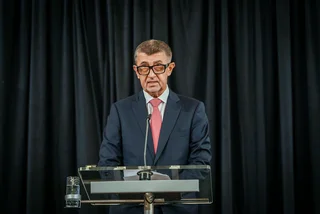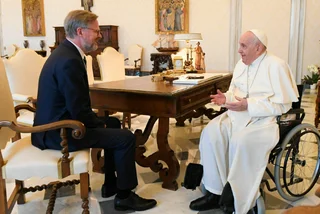The list of candidates for the Czech presidency has been announced – there’s a wide range of personalities to choose from.
Czech presidential elections are fast approaching. The first round of voting will take place on Jan. 13 and 14, following a potential second round featuring the two most popular candidates on Jan. 27 and 28.
A total of 22 submissions to participate were received by the Ministry of the Interior, but when the final list of confirmed candidates was confirmed on Jan. 25, only nine candidates made the cut. In order to qualify for the vote, candidates must either gain at least 50,000 signatures from the general public, at least 10 signatures from senators, or 20 from members of parliament (MPs).
The nine candidates who will fight it out to become Czech head of state represent a wide range of political views and visions for the future of the country. They will all participate in the first round of voting, and unless one candidate receives an absolute majority (at least 50 percent), the top two candidates will then have a run-off against each other in the second round.
Here’s our guide for who to watch in the weeks ahead.
Who are the favorites?
Polls indicate three clear frontrunners. Former prime minister Andrej Babiš, retired army general Petr Pavel, and former head of Brno’s Mendel University Danuše Nerudová all have a chance of getting through the first round to the run-off vote.
🔴 Do prezidentských voleb zbývá sedm týdnů. Kdyby se konaly nynÃ, zÃskali by podle průzkumu v prvnÃm kole nejvÄ›tÅ¡Ã podporu Andrej BabiÅ¡ a Petr Pavel. Za nimi by se umÃstila DanuÅ¡e Nerudová. pic.twitter.com/VRkHUCALpm
— ÄŒT24 (@CT24zive) November 27, 2022
Andrej Babiš
Babiš, leader of the ANO party and prime minister from 2017 to 2021, is probably the most controversial figure in modern Czech politics. The billionaire businessman created ANO in 2011, and it has since become the most popular single political party in the Czech Republic, running on a populist platform.
While in power, ANO made the most of Czechia’s growing prosperity with a series of tax breaks and discounts. Yet Babiš’s government racked up enormous debts during the Covid-19 pandemic; arrears that are now being blamed by the current government for financial difficulties.
Born in Slovakia, Babiš has been criticized for having few clear political objectives. On social issues, he mixes rhetoric critical of immigration and his friendship of Hungarian Prime Minister Viktor Orbán with support for LGBTQ+ rights including gay marriage. During his time in power, he was critical of climate change directives from the EU, claiming they had been formulated by “green fanatics” in Brussels.
But the biggest controversies surrounding Babiš relate to alleged conflicts of interest and corruption. He is currently on trial accused of assisting in EU subsidy fraud before entering politics. His ownership of various newspapers has also stoked anger, and he is accused of having been a serecet service agent in Czechoslovakia under the communist regime.
Petr Pavel
Retired army general Petr Pavel has a stellar military career behind him. He was Chief of Staff of the Czech Armed Forces from 2012 to 2015, before being elected Head of the NATO Military Committee from 2015 to 2018.
As such, Pavel has deep expertise on the biggest issue of the day: Russia’s invasion of Ukraine. Pavel has been a stern critic of Russia, and advocates strongly for Czech military and financial support for Kyiv. He is a committed believer in Czechia’s membership of the political West, as opposed to those who argue that the country should look to the East for allies.
Pavel is liberal on most social issues, and has expressed support for the Czech adoption of the euro. He is a long-standing critic of the populist politics used by his presidential rival Babiš, as well as the previous pro-Russia views of Czechia’s current president, Miloš Zeman.
Yet Pavel also has his personal controversies. His membership of the Czechoslovak Communist Party in the years leading up to the Velvet Revolution has long been known, but further accusations against him have been made during the presidential campaign, including claims that he was trained to become a spy in NATO countries. Pavel insists that his Communist Party membership was necessary at the time to pursue his military career.
Danuše Nerudová
Aiming to become Czechia’s first ever female president, former rector of Mendel University Danuše Nerudová emphasizes the different style of leadership that women can bring. Referring to Babiš and Pavel, she said that “our country cannot be managed like a company, and not even like a military unit. Our country needs to be managed like a family.”
This, she says, means taking care of “the most vulnerable and the weakest.” Nerudová supports gay rights on marriage and adoption, and criticized outgoing President Zeman for not issuing an official statement about the recent murder of two people at an LGBTQ+ bar in Bratislava.
Nerudová supports Czechia’s green energy transition, including a ramping-up of nuclear energy production. She also emphasizes Western partnerships, saying one of her ambitions as president would be to help bring about a visit by the U.S. president to Czechia.
And another selling point for Nerudová is her relative lack of controversy compared to the other leading candidates. Unlike Babiš and Pavel, she is not weighed down by present or historical accusations of misconduct or Communist Party involvement. General elections in October 2021 showed Czechs eager for less contentious leadership; similar dynamics may work in Nerudová’s favor in January.
The rest of the field
Barring a major upset, two out of Babiš, Pavel and Nerudová are expected to make it to the second round run-off. The remaining six candidates enjoy significantly lower popular support, with the latest polls suggesting that the fourth-placed candidate will only gain 5.5 percent of the vote.
Pavel Fischer
Independent Senator Pavel Fischer has been a long-standing critic of Russia under President Vladimir Putin, and has also condemned Zeman’s role in fostering friendly ties with Moscow prior to Russia’s invasion of Ukraine.
Fischer is a vociferous opponent of the Communist Party of Bohemia and Moravia, which continued to play a major role in Czech politics until its failure to enter parliament in 2021 elections; a departure that Fischer described as a “joy”. He appeals to conservatives on social issues, opposing, for example, the legalization of same-sex marriage.
Marek Hilšer
Another strongly pro-Western candidate, Hilšer became a senator in 2018. Motions tabled by him and adopted by the Senate have included a condemnation of China’s repression of minorities, while he also launched a petition calling for Taiwanese involvement in World Health Organization (WHO) activities.
Hilšer has been an active figure in Czech politics over recent years, but his presidential campaign is being conducted somewhat inconspicuously compared to the other candidates.
Josef Středula
Another well-known face in the elections is trade unions leader Josef Středula. Unsurprisingly, given his position as head of the Czech-Moravian Confederation of Trade Unions, Středula advocates for left-wing economic policies including a more generous welfare state, higher wages, higher pensions, and higher sick pay.
Středula has led criticisms of the current government in fighting the rising cost of living; he organized a demonstration in Prague in October to protest against the government’s response.
Others
Other candidates projected to gain only a small share of support are former Charles University rector Tomáš Zima, Freedom and Direct Democracy MP Jaroslav Bašta, and the President of the Czech Association of Debtor’s Denisa Rohanová. Charismatic billionaire businessman Karel Janeček was expected to run too, but he has faced complications as the Ministry of the Interior refused to recognize a large number of his signatures from the general public, something Janeček has pledged to appeal.
Predictions from the experts
Expats.cz asked political experts for their predictions and thoughts on the elections. Petr Kaniok, an Associate Professor at the Department for International Relations and European Studies at Brno’s Masaryk University, said that although there are “a lot of variables,” he expects that “Babiš and Pavel will make it to the second round.”
Kaniok points out the likelihood that the presidency will go to one of the three leading candidates; Pavel, Babiš ,or Nerudová. He says that “Nerudová and Pavel are explicitly in favour of EU membership and European integration” and that “both represent similar voters.” Babiš, meanwhile, has a far more “critical” attitude towards the West.
Former Czech political cabinet member Jiří Pehe meanwhile thinks “Babiš’s chances are relatively slim, and not just because of his trial for EU subsidy fraud.” Even if Babiš makes it to the second round of voting, Pehe says “surveys show that four other candidates would beat him there.” And Pehe points out that despite controversy over his Communist Party past, General Pavel “is highly respected for his service to the country after 1989.”
There is no clear favorite for the Czech presidential election, making every vote even more important. And while the presidency is a largely ceremonial role, the elections will give a strong indication of where Czechia stands politically – and where it is headed in the years to come.












 Reading time: 7 minutes
Reading time: 7 minutes 



 English
English
 Czech
Czech
 Italian
Italian
 Hungarian
Hungarian
 German
German

































